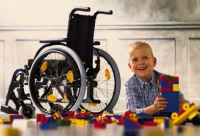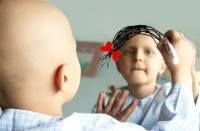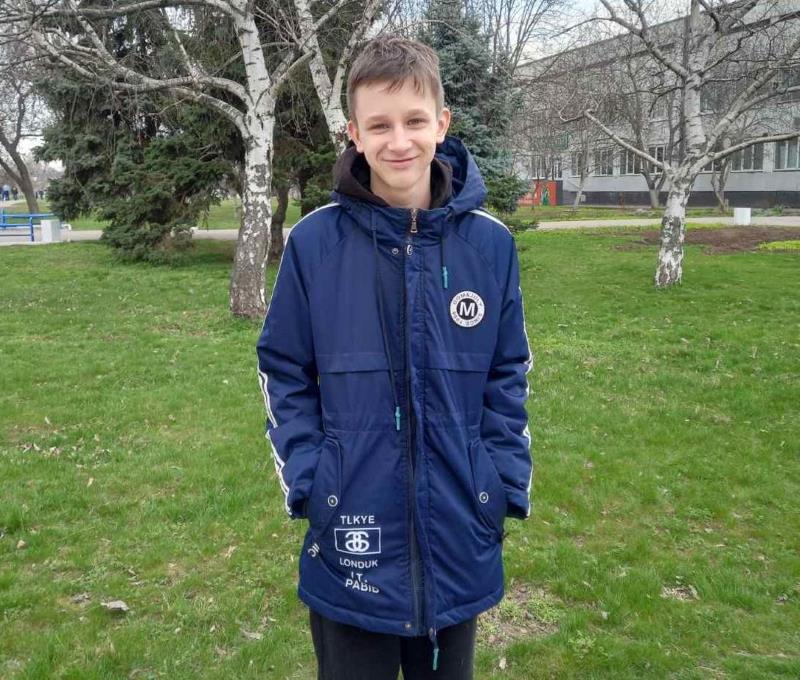We are walking down the dimly lit corridors. We make quite a procession I must say-all of us dressed in white robes, stethoscopes proudly hanging from our necks, our elderly teacher slowly leading the way. It is a children's hospital and it isn't like any other hospital one might happen to visit. There is no grave silence in the corridors that makes one's footsteps echo, no blank faces that are tired of sorrow, even the smell is different. The kids fool around, some play hide-and-seek in the gloomy basement where naked pipes hang from the ceiling, they laugh, talk in the wards, play cards and mobile phones.
As we walk up the stairs we meet a boy of about five years of age with his mother. He is holding her hand in a trusting way, as only a child can, his eyes glowing with excitement : "Mom, look how many doctors are there!"- he cries out. His mother smiles. We smile too. As a matter of fact it's the first time somebody has called me "doctor".
Our destination is at the far end of the cardiological department. We are off to see the smallest patients. Most are just a few months old. Of course one begins to feel sorry for someone so little and already in trouble. But the fact is that the babies are comfortable where they are. We are not about to see the little ones sneakily huddled in their mother's arms. We are not welcome there. Our skills must improve a lot before we are admitted to the world of children with caring families, the world of the most demanding patients possible. We are destined for the place where we are happily received-the only such place in the medical world. We are headed for the ward with little orphans.
"It was awful last week"- our teacher tells us. "We had a baby from a drug addict here. Sure enough she gave the baby to us. He was crying so loud that we could hear him three stories down."
"Why so?"- one student wonders.
"He was asking for drugs, you see. His mother was an addict and so he inherited her need through her distorted metabolism. Now drugs are part of his system"
"So what can one do then? What's the cure?" I wonder and look at the teacher expectantly.
"There is no cure." she answered, her voice filled with sadness. "We give him tranquilizers to help him come down. He is a little better now. But this is not the worst part. He has no future. You see, the moment he tries drugs he becomes an addict, it is a part of him from birth. So according to the law he is not eligible for adoption. It means that he will never ever have a real family." She pauses. "We used to have very few kids like this when I started here many years ago. Now year after year the number of drug addicted mothers grow. Most leave their kids with us.", the sadness in her voice is transmittable.
We continue through a maze of corridors. I sometimes wonder why hospitals are built in the manner of gigantic labyrinths. Maybe it is something to do with the philosophical complexity of life and death. "Hardly", I answer myself the mystery remaining.
We open the door and come in one by one into a small room. Tiny beds line the walls painted white and blue. This in not the way a child's dormitory is supposed to be. There should be light and brightness and joy.
"This one has trouble with swallowing", our teacher starts to explain. "So far we can only hope for the best. She won't last long if she won't have her reflexes repaired." One by one we examine the plastic tube coming from the baby's nose.
"Pay attention to this one. He has the Down syndrome. Look at the eyes and hands." Again we all come closer.
As time passes we examine the kids. Each takes one out of the little cradle and does the standard procedures.
I take one. He is a little boy with curious blue eyes and a smiling face.
"He likes your jewelry.", my classmate notes
"He is not the only one." we laugh. The child holds happily to my finger. I am really clumsy with baby's clothes I confess. I've never had a sister or a brother or even a little nephew. But the baby doesn't mind. It simply enjoys my being near, my smile and my hand gently caressing his head. He stretches his hand to grab my stethoscope. It's also a boy for him, just as my rings.
I notice some old toys scattered in his bed. Well, at least he has something donated by other people. The only thing they can't donate is attention and love. And he seeks those things among us, among the only adults he knows. He is happy when we come. True, the kids here have a nurse and she cares for them well. But there are too many kids and the nurse is too busy trying to keep them dry and clean. There is no time for anything else. Most of the day between the procedures they lie lonely in their beds blankly staring at the walls.
I am through very quickly. Then I try to put the baby back into bed. He starts to cry as he realizes that I am about to abandon him. As everyone ever does.
A smile-then a good-bye. In his life nothing lasts. I try to give him a toy, which should be a comfort. He throws it away. "I don't want it, I want you, your smile, your kind eyes. "Please stay and play with me.", he seems to say. I hold him in my hands some more and then repeat my attempt, I really have to go. And again I fail.
"He likes you.", the teacher says. "Here, give him to the nanny."
The child gradually comes down.
I think he already knows more about life then most grown-ups. You can't always get what you want. I caress his head once more. It is good-bye. Maybe he won't be here when we return next week. But I want so badly for him to remember the tender touch of my hand. I hope that many years form now he will not become a lonely derelict without money or friends. I don't want him to become an emotional void.
I wish to give him energy to fight, the need to seek and the luck to find.
To find what he needs most - the place where he'll be loved.
We hear dozens of wailing little voices. We've left and they already miss us. We've visited their world and now we leave like a shooting star. Soon the picture disappears like a dream. Only the urge remains - the overwhelming desire to help those you can help, to improve the life of those around you. After all to change the world you don't have to be a hero. You just have to give someone a bit of your comfort and love.
Editor's Note
Olga Karpenko is a medical student in her third year of study.



